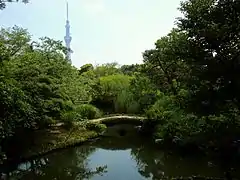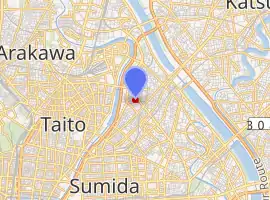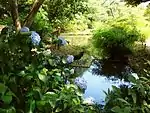Mukōjima-Hyakkaen Garden
Mukōjima-Hyakkaen Garden (向島百花園, Mukōjima Hyakkaen) is a flower garden located in Sumida, Tokyo. The garden created by a merchant is different from daimyō gardens — it is not a traditional Japanese garden. It is the only surviving flower garden from the Edo period. Mukōjima comes from the region's old name, Hyakkaen was chosen to mean "a garden with a hundred flowers that bloom throughout the four seasons". The garden covers an area of about 10,886 m2.
| Mukōjima-Hyakkaen Garden | |
|---|---|
| 向島百花園 | |
 Mukōjima-Hyakkaen Garden with Tokyo Skytree in the background | |

| |
| Type | Japanese garden |
| Location | Sumida, Tokyo, Japan |
| Coordinates | 35°43′27″N 139°48′56″E |
| Area | 8,718.52 square metres (2.15439 acres) |
| Created | 8 July 1939 |
History
During the period from 1804 to 1830 bourgeoisie emerged as a strong social class, and the cultural aspects of townspeople of Edo began to thrive. The master of this garden was Sahara Kikū, a wealthy dealer in antiques. He purchased the land in Terajima Village and obtained the cooperation of various bunjin — writers and artists with literary tastes — to create an elegant garden of shrubs and flowers. He planted ume trees given by his friends such as Ōta Nanpo and Shibutsu Ōkubo. At the time when the garden first opened, its main feature was 360 ume trees. The garden was later augmented with collections of flora found in the ancient Japanese poetry of the Man'yōshū and in the Chinese Shi Jing enabling visitors to enjoy blooming flowers throughout the year.
The garden suffered extensive damage two times, when it was inundated during the Great Sumida River Flood of 1910, and when it was burnt to the ground during the Great Tokyo Air Raid in 1945.
In 1938, in order to preserve the garden for posterity, the owner donated it to the City of Tokyo and it was officially opened to the public as an admission charged garden in 1939. In 1978, it was designated by the national government as a famous site of historical significance under the terms of the Cultural Assets Preservation Law.
The garden is an 8-minute walk from Higashi-Mukōjima Station on Tobu Isesaki Line, or a 13-minutes walk from Keisei Hikifune Station on Keisei Line. Entrance is 150 yen for adults.
Gallery
 Entrance
Entrance Pond
Pond Well
Well Japanese calligraphy
Japanese calligraphy
External links
| Wikimedia Commons has media related to Mukojima-Hyakkaen Garden. |